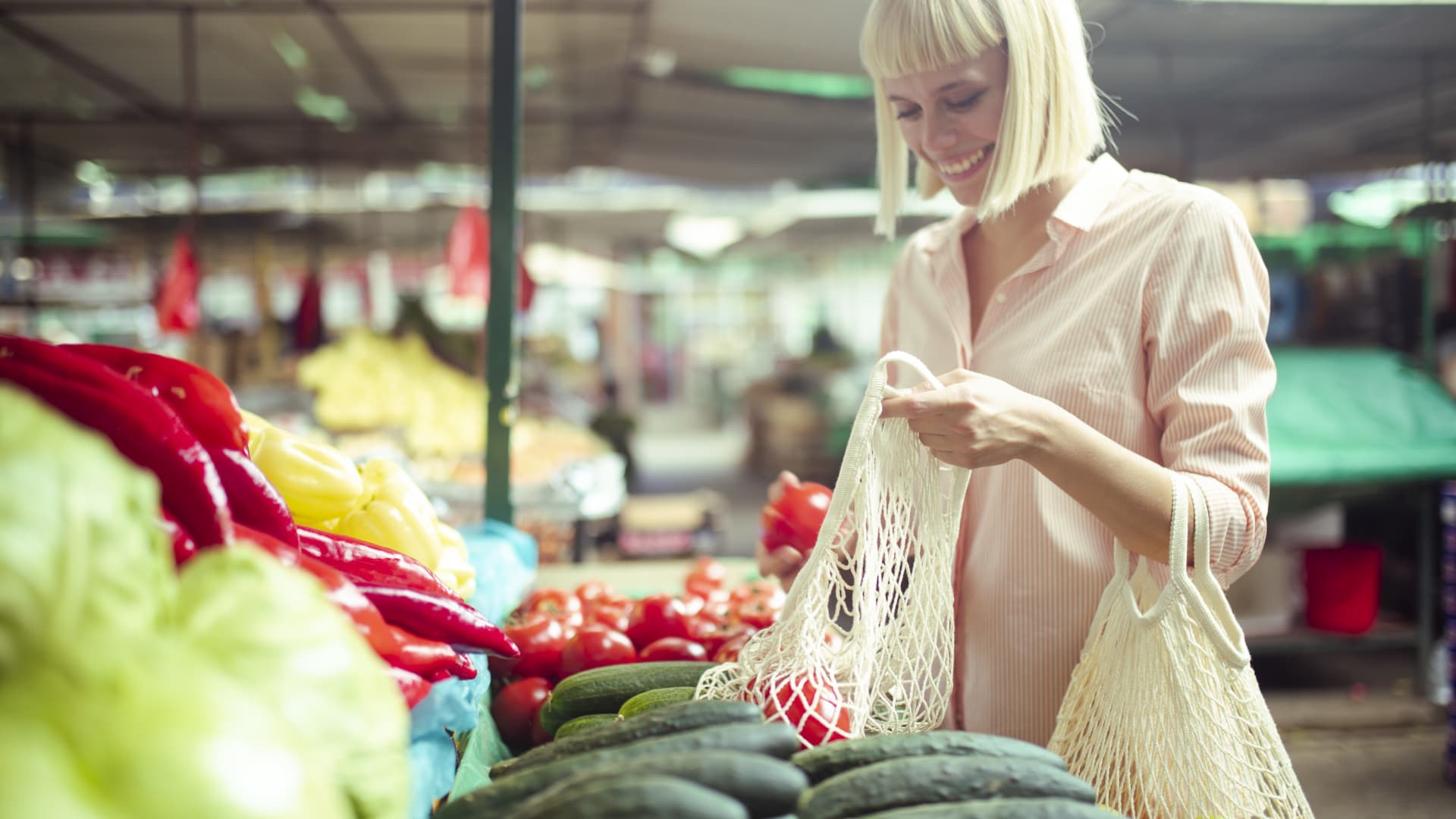
Let's face it: Groceries are a lot more expensive than they used to be.
The cost of eating at home has increased by 12.2% since June 2021, according to the U.S. Bureau of Labor Statistics' Consumer Price Index (CPI). That's part of an overall 10.4% increase to the cost of food, which also includes the cost of meals out.
You might be thinking about finding ways to cut costs on your grocery spending — like abandoning the fresh produce at your nearest farmers market for your generic neighborhood supermarket. Don't do it unless you have to, says Adante Hart, a registered dietitian based in Raleigh, North Carolina: Due to inflation, the prices between the two aren't actually that far off anymore, and the health benefits from the farmers market are worth the difference in cost.
"The gap between the price you'd see at a farmers market and grocery store is getting smaller," Hart tells CNBC Make It. "I know a lot of people before would say that shopping at the farmers market was more expensive than the grocery store, but now those prices are getting a little closer."
In Raleigh, bananas at the North Carolina State Farmers Public Market currently cost between 63 and 85 cents per pound, according to a U.S. Department of Agriculture report. At a local Food Lion, those bananas cost 59 cents per pound, according to the supermarket chain's website — less expensive, but not significantly so.
Some items may even be cheaper at farmers markets now: Carrots, for example, cost between 66 and 72 cents per pound at the Raleigh market, compared with 69 cents per pound at Food Lion.
And considering how similar the costs are, the health benefits of farmers markets stand out, dietitians say.
The health benefits of fresh produce
Nutrients in fruits and vegetables oxidize over time and lose value as days go by, says Reyna Franco, a registered dietitian nutritionist in New York — and farmers market produce typically goes from the farm to a store shelf within 24 hours.
By contrast, supermarket fruits and vegetables can take much longer to arrive on shelves, especially produce grown in far-away locations. Foods that aren't in-season in your state probably have additives to keep them fresh for long periods of time, Franco says.
"The wonderful thing about the food that you get from the farmers market is that they don't need to put toxins or waxes on the food for it to stay fresh during travel," she says.
Farmers markets also offer you the opportunity to speak directly to the farmers who grow your food. Hart recommends getting to know them, because depending on the relationships you build, you may eventually be able to negotiate slightly lower prices.
"Sometimes, you can work with them and they'd be able to work with you and negotiate. At the end of the day, a lot of the farmers don't want to bring the produce back home. They would rather sell as much as they can," Hart says.
Local availability and accessibility
Finding your nearest source of locally farmed produce doesn't have to be daunting. The USDA has a local food directory, where you can type in which foods you're looking for, filter by location and choose the farmers market category.
You can also use the word-of-mouth method, Hart says: "Ask around. Talk to farmers in the area. If you're going to a restaurant that sources things locally, ask them where they get their produce from."
Hart notes that there are weekend farmers markets in most U.S. cities, which are likely findable with a Google search. Those offer great opportunities for price shopping between the market's multiple vendors.
"Different farmers have things for different prices, so see what the best deal is for you," Hart says.
If the groceries at farmers markets exceed your budget, Hart says you still shouldn't go back to supermarkets unless you have to. He recommends trying food pantries, produce donations at houses of worship and keeping track of any mobile markets coming soon to your area. Most farmers markets also accept the Supplemental Nutrition Assistance Program (SNAP) and Special Supplemental Nutrition Program for Women, Infants, and Children (WIC).
"There are lots of options out there if you can't make it to the market," Hart says. "It's a privilege for some people. In this economy, you have to do what you have to do."
Sign up now: Get smarter about your money and career with our weekly newsletter
Don't miss:
"local" - Google News
July 24, 2022 at 08:00PM
https://ift.tt/xOGNrPX
Why rising inflation means you should ditch supermarkets for your local farmers market - CNBC
"local" - Google News
https://ift.tt/T7Rm4AG
https://ift.tt/4oxn9DY
Bagikan Berita Ini














0 Response to "Why rising inflation means you should ditch supermarkets for your local farmers market - CNBC"
Post a Comment